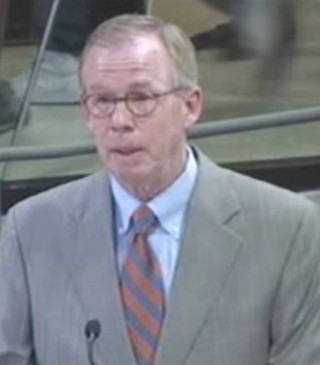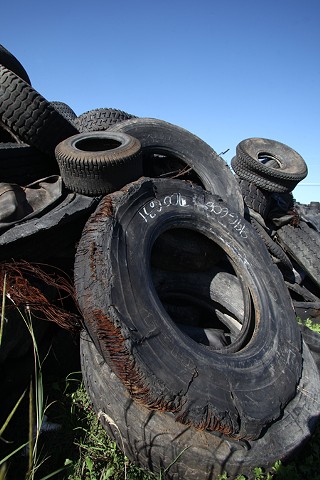Not Quite Fleet
City management still catching up with the mess at Fleet Services
By Jordan Smith, Fri., July 16, 2010
More than seven months after city officials first told the Chronicle, and the City Council, that our November 2009 inquiries about the pile of city scrap tires abandoned in Southeast Austin were the first they'd heard of the mess – and two weeks after they publicly reiterated that claim – officials acknowledged last week that city management had in fact been formally alerted to the scrap tire pile in August 2009, when a Fleet Services manager, Daniel Lomas, sent an e-mail to City Manager Marc Ott with details about the city's illegal dumping of scrap tires – as well as several other allegations of misconduct.
Last week, at a July 8 meeting with the Chronicle at City Hall with several key officials – including Fleet Officer Gerry Calk, Deputy Fleet Officer Urcha Dunbar-Crespo, Chief Financial Officer Leslie Browder, Deputy CFO Jeff Knodel, Assistant City Attorney Lee Crawford, and top city spokesman Doug Matthews – the officials acknowledged that Ott had received the e-mail in question and responded to it and had forwarded it to then-City Attorney David Smith. (A few days earlier, the officials couldn't immediately find the e-mail and were questioning its existence.) However, Crawford said, none of the responsible officials – managers who would presumably need to know, especially Browder and Knodel, who have direct supervisory authority over Fleet – were ever told about the e-mail to Ott or about the problems Lomas described.
Instead, it appears Smith turned the communication over to the Austin Police Department's Special Investigations Unit without mentioning it to anyone else or even following up with Ott. "Apparently he didn't talk to anyone in this room" about the e-mail, Crawford told the Chronicle at last week's meeting. "And frankly ... he didn't tell me about it either. The people he did tell about it are the [SIU] people at APD," he said, "because [it] appeared to involve potential criminal conduct." (In late May, Smith resigned his position after criticism of his handling of the KeyPoint Government Solutions report reviewing the police shooting of Nathaniel Sanders II.)
Some background: The Chronicle first reported on Dec. 4, 2009, that thousands of tires removed from city vehicles and destined for disposal instead were stacked on property leased by Victor Almaguer, owner of Vic's Tire Service, who previously had held a contract to fix flats on city vehicles. Almaguer was not registered to transport or store large numbers of tires, as required by Texas law, but said he had been told to transport and store them by Bill Janousek, the former manager of Fleet's tire program. Janousek was placed on administrative leave shortly after our first story ran and was later fired – though the city said it terminated him for violating a city personnel policy (i.e., lending large amounts of money to Almaguer) and not for anything directly connected to the tire dumping. Janousek is appealing his termination.
After that story was published, Lomas said he was stunned to read that the city denied knowing anything about the scrap tire situation prior to our report. In fact, Lomas said, he had been telling his supervisors and city management about the problem for months – and he had reported to Fleet officials and to those at City Hall, including Ott, other instances of possible corruption inside Fleet for nearly two years. (For details on Lomas' allegations, see "Kicking the Tires at Fleet," July 2.)
In his Aug. 2, 2009, e-mail to Ott, Lomas reported that he'd spoken with Almaguer and that the tire man had confirmed that he'd picked up scrap tires from the city. "Almaguer said he has a stockpile of used scrap tires that he got from Bill Janousek that will cost $45,000 to $65,000 to dispose of," Lomas wrote to Ott. "Almaguer said he was not subcontracted ... for picking up scrap tires." Lomas also told Ott that Almaguer admitted that he was not "registered with the Texas Commission on Environmental Quality as required by law for transporting, disposing or storing scrap tires." Ott passed that information on to Smith and assured Lomas that the city would "get to the bottom of it." (The full e-mail, along with Ott's response, is posted with this story online.)
Yet in November 2009, when the Chronicle began asking questions about the city's handling of scrap tires, Smith had apparently not told anybody else in management about the tire issue or any of the other allegations, which included questions of bid-rigging on city contracts. And as recently as two weeks ago, June 29, Browder released a memo she'd written to Ott, again insisting city officials only learned of the scrap tire pile in November 2009 – four months after Lomas' e-mail to Ott.
Reminded of this correspondence last week, officials meeting with the Chronicle acknowledged that Ott and Smith had been told about the pile of tires – but said they themselves hadn't been. That's about all they would say on the topic because, Crawford noted, the criminal inquiry into the matter is ongoing. (The Travis County District Attorney's Office confirmed that the matter remains under investigation.)
'Extensive Review'

So last week's meeting did not resolve lingering questions about what Fleet and city officials knew about problems in the department or what has been done to address those problems. For example, in the course of reporting our original story about the scrap tire pile, the Chronicle discovered that the city had failed since at least 2006 (the first year for which we requested records) to properly track its scrap tires as required by state law. TCEQ requires all scrap tires to be tracked from the time they're removed from a vehicle through to their ultimate disposal, via a five-part manifesting form. The city had not properly completed any of those forms, making it difficult to determine how old tires were being disposed of. Dunbar-Crespo, who moved to Fleet from Purchasing in 2008, says it was at some point in 2008 that Fleet officials first realized they might have a problem with scrap-tire tracking; that led to conversations with TCEQ about whether the city was tracking its tires properly (it wasn't, TCEQ said) and what needed to be done to comply with environmental regulations.
Nonetheless, by fall 2009, when we first asked for the manifesting records, the city still hadn't changed its faulty practices. "We were still investigating," Dunbar-Crespo said. "We had an extensive review going on across the board." (Since December, Calk said, the city has revamped its tracking and disposal of used tires and has created a multilayered tracking process that should keep tires from being improperly diverted.)
In addition to the Aug. 2, 2009, e-mail to Ott, Lomas provided the Chronicle with an audio recording of an August meeting that included Calk, Operations Manager Irvin Schmidt, and Fleet's Human Resources manager Sharon Huckabee, during which Lomas told Calk specifically that the city wasn't properly disposing of its scrap tires. During the recorded meeting from Aug. 24, 2009, Lomas reported the illegal disposal problem directly to Calk, his immediate supervisor. "It's been going on for years ... that I know of. And you continue to let it happen," Lomas tells Calk on the recording. "And I've given you where to look, and now ... I think it is a liability on the city's behalf because of all the dumping we've been doing of discarding these tires improperly. And we're talking about thousands of tires that have been dumped, and we're liable for them." Lomas tells Calk that Janousek is passing the tires to Almaguer to "dump them for him" and reminds Calk that Almaguer is not registered to do that work nor is he contracted with the city to handle scrap tires.
At the meeting last week, Calk said that he remembers the August meeting (convened to discuss a different topic) but that he simply didn't catch that Lomas was making a "report" that something was wrong with the city's disposal of scrap tires. "I was told in that meeting that there was illegal dumping going on. [The conversation] did not talk about a stockpile of tires. I missed picking up on that," Calk said last week. "I just failed to pick up on it; it just did not register with me that he was discussing illegal dumping at that point."
Hearing no substantive response from the city for months after his initial reports, Lomas met in February of this year with Browder and Crawford. But Crawford said that when Lomas played the recording (in part) for them, he wasn't sure that Lomas' report would have put Calk on "inquiry notice" that something was going on that needed looking into.
'The Best Interest of the City'
Both Crawford and Browder diminish the importance of Lomas' recorded August 2009 meeting with Calk. In her June 29 memo to Ott, Browder described the conversation with Calk – which in fact lasts nearly five minutes – as alternately a "single reference" or a "single statement" in a much longer meeting. Again last week, Crawford said that he didn't know that Lomas' statements during that meeting – which he called "pretty innocuous" – could equate into his having reported to anyone in management that there was something that needed investigation: "Maybe you could have gotten that from the snippet of meeting on August 24, maybe you didn't draw that conclusion," Crawford said. "Apparently Gerry [Calk] didn't draw the conclusion at the time."
Crawford also acknowledged that he did not alert APD to the existence of the recording (it wasn't until more than two months after the meeting that APD found out about the audio, when Lomas told them about it) but says he did tell Smith about it. What Smith did with that information, Crawford doesn't know. "I'm not going to second-guess [Smith's decisions] at the time," he said. "I can assure you that whatever David did, he thought was in the best interest of the city."
In the end, officials said they believe the backlash over the tires has helped the city to redesign its tire program. Fleet has since incorporated tires into its regular inventory processes, Calk said, and has created several new layers of oversight to ensure that tires are properly moved through inventory and ultimately to the scrap heap. Moreover, Crawford said, the city has "taken seriously" all allegations that have come up regarding possible problems at Fleet. Maybe the city hasn't moved as quickly as the officials "would have liked" to get to the bottom of problems, but they have worked diligently to do so, he said. And the city has hired an outside auditor to review Fleet's operations. That review should be complete in three or four weeks, said Deputy CFO Knodel. From there, said Browder, her department will put "together an action plan for anything that needs to be fixed."
Overall, said Crawford, the city is committed to weeding out the problems at Fleet. "Do we feel like we're headed in the right direction? Yes, we do," he said. "We've taken ... allegations seriously as they've come up, and we've tried in the past and are currently trying to put in place effective controls to make sure that we're wise stewards of the taxpayers' money. That's the bottom line. And nobody here is trying to cheat the taxpayer at all."
On Aug. 2, 2009, Fleet Services Manager Daniel Lomas e-mailed City Manager Marc Ott about problems at Fleet; Ott responded to Lomas and forwarded the e-mail to City Attorney David Smith. That correspondence is posted with this here.
Got something to say on the subject? Send a letter to the editor.









